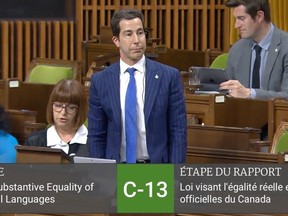I ask our senators to consider judiciously and objectively the arguments of those of us who have expressed strong reservations about Bill C-13.
Clifford Lincoln • Special to Montreal Gazette
Published May 24, 2023 •

I wrote to Anthony Housefather after the vote on Bill C-13, the new federal language legislation, to thank and congratulate him for his lone courageous and principled stand in the face of overwhelming odds. I pointed out that one vote out of over 300 may not count mathematically, but that its weight as an expression of democratic dissent is all the more exemplary and meaningful. He deserves our gratitude and admiration for his stand.
We all know of incidences in our own lives and in history where lone dissenters were not only decried but at times even punished and jailed for their minority opinions and opposition, but subsequently proven right by the unfolding of events. Indeed, majority opinions and decisions are not inevitably judicious or equitable, and this is why democratic and open societies not only allow dissent, but open the way for redress before our courts of law.
In the case of Bill C-13, Housefather justifiably argues that by importing into this federal statute provisions of Quebec’s Bill 96, which applies the notwithstanding clause to shelter it from court redress and to nullify the application of Charter of Rights guarantees, a serious and negative constitutional precedent is being created. This is the reason why he proposed amendments to remove from Bill C-13 all references to Bill 96. His is far from being a solitary opinion. A number of credible legal minds and constitutional experts have joined minority-community voices in strongly expressing the same cautionary advice.
It defies both logic and understanding that not only the federal government — the central and ultimate trustee and protector of minority rights — but all main federal parties glibly accept the notwithstanding clause being imposed on it by a provincial statute, thereby preventing its citizens from legitimate redress before the courts and the invocation of Charter rights.
Legitimate dissent when it comes to any issue involving language always comes with a heavy price — that of being branded as opposing the promotion of French, and being disloyal to Quebec. This characterization is not only glib and superficial, but unjustified and unfair. I happen to know Housefather and many of the opponents of Bill 96 and Bill C-13. All without exception fully endorse, as I do strongly, the vitality and enhancement of French, while being loyal and contributing citizens of both Quebec and Canada.
The Senate was designed as a chamber of sober second thought, and for this very reason not subjected to electoral constraints and pressures, and thus able to examine House legislation with the utmost openness and impartiality. I earnestly ask our senators to consider judiciously and objectively the arguments of Housefather and of those of us who have expressed strong reservations about the introduction of Bill 96 references into Bill C-13, and its serious constitutional impacts. A straightforward solution would be to pass amendments removing references to Bill 96 from the federal bill, which in no way would detract from its central objectives.
As I pay tribute to Housefather for his stand, I am reminded of another dissenting voice about the introduction of the notwithstanding clause into the Constitution Act of 1982. The late eminent lawyer Morris Manning in his subsequent analysis of this provision wrote these prophetic words 40 years ago: “If our freedom of conscience and religion can be taken away by a law which operates notwithstanding the Charter, if our rights to life and liberty can be taken not in accordance with the principles of fundamental justice, what freedom do we have?”
The notwithstanding clause is a blot on our Constitution, and we should all firmly oppose its casual and unjustified use in any legislation, whether federal or provincial. It should have no place in a democratic and open society that values fundamental rights for all its citizens. This is why I applaud Housefather for standing tall.
Clifford Lincoln resigned from the Quebec cabinet in 1988 over the use of the notwithstanding clause in Bill 178. He later served as a federal MP. He lives in Baie-D’Urfé.




















Recent Comments